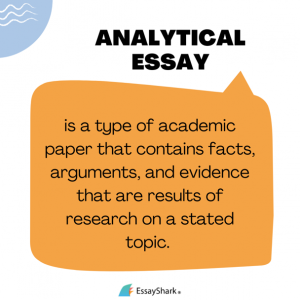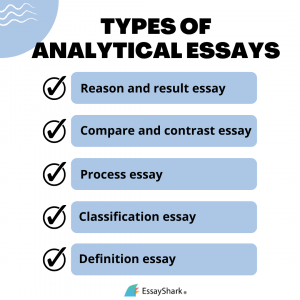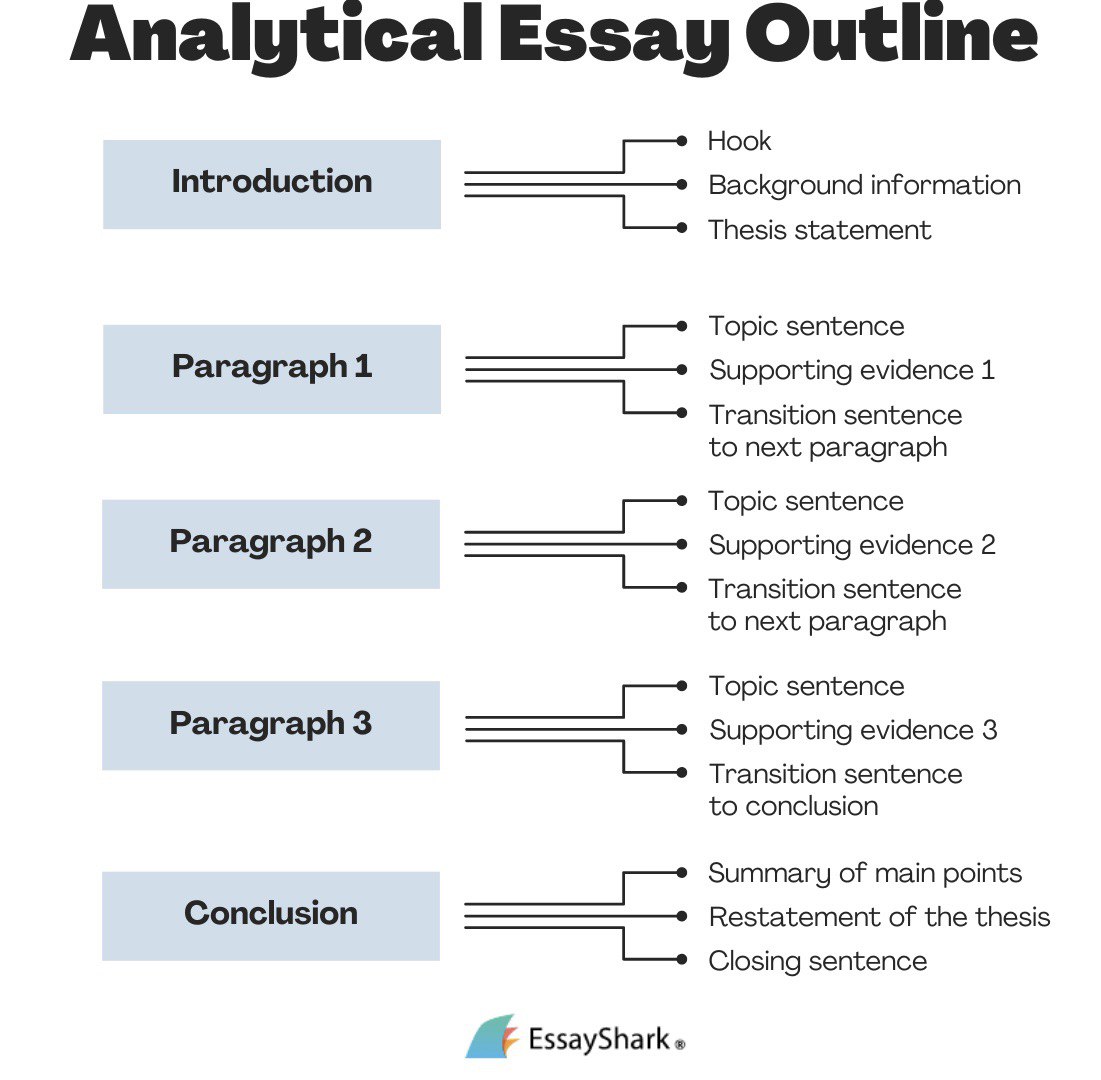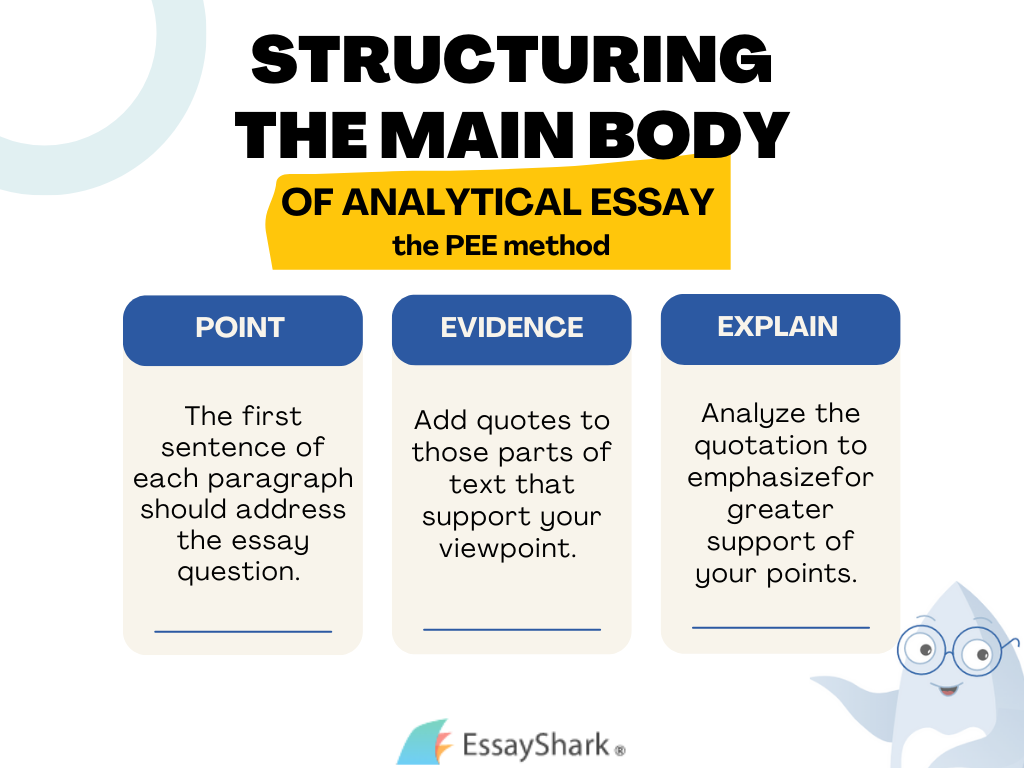Among the various types of essays, students frequently are assigned to write an analytical essay. This type of paper has its peculiarities that are vital to consider when writing. This article presents a full guide on writing an analytical essay and an analysis essay definition. We’ve prepared great analytical essay topics, chosen by our experienced authors. You can also buy analytical essay written by our specialists.
Table of contents
- What is an analytical essay?
- Types of analytical essays
- Video lesson on analysis essay writing from EssayShark
- Structure of an analytical essay
- Some more tips on writing an excellent analytical essay
- Stages of writing an analysis essay
- Guidelines and tightening your essay
- Mistakes to avoid while writing an analysis essay
- Topics and ideas for an analytical essay
- Analytical essay sample
- Analysis essay writing checklist
- FAQ on analysis essays students often ask
- Analysis essay writing help from our authors
What is an analytical essay?
 An analytical essay is a type of academic paper that contains facts, arguments, and evidence that are results of research on a stated topic. To write an analytical essay correctly, you must present facts, prove their relation to the subject, and evaluate each aspect that explains the topic. Writing an analytical essay means giving the whole picture, defining terms, illustrating cause and effect, classifying the ideas, etc.
An analytical essay is a type of academic paper that contains facts, arguments, and evidence that are results of research on a stated topic. To write an analytical essay correctly, you must present facts, prove their relation to the subject, and evaluate each aspect that explains the topic. Writing an analytical essay means giving the whole picture, defining terms, illustrating cause and effect, classifying the ideas, etc.
The primary challenge of writing an analysis paper is that you need to provide various points of view with “for” and “against” arguments, not just the ones you agree with. The primary aim of an analytical paper is not to show your idea or reflect on an analyzed source, but to develop critical thinking.
For example, a topic about positive consequences of war requires you to forget all conventional thinking and change the way you look at the issue at least for a few hours.
Speaking on an analysis essay, you need to understand the data carefully selected to define the core point on some subject, topic, or event. The core peculiarity of an analytical essay is sharing authors’ thoughts and insights on particular problematics. You can define what is an analytical essay by some core features. Among them is explaining and revealing the essential information to make an essay’s problematics clearer to the readership. An analysis essay can be written on various topics, including such broad areas as art, history, events, music, literature, politics, sociological phenomenon, psychology, and plenty more. The overall goal of writing an analytical essay is defining what is behind the apparent opinions and contextualizing the main issues of the analyzed subject. The area of an analysis essay’s actuality is vast. Journalists, literary critics, and other specialists frequently write such essays. You can read such types of essays in magazines, popular blogs, and web resources.
Types of analytical essays
Let us begin with defining five main types of analytical essays. Each has its peculiarities and must follow an appropriate writing style and reach particular goals.

1) Reason and result essay
Another term for this type of analytical essay is “cause and effect.” As understood from the term, a paper written in the reason and result style follows the main goal to define the purpose and the effect of some event or object on areas of our lives. The impact of such a phenomenon on people is a crucial subject to investigate and define for a reason and result essay. The implications and consequences must be defined and analyzed from every side.
2) Compare and contrast essay
Sometimes students mess up with a standard analytical essay definition, assuming that all of them are comparison and contrast, but that is not so. The main peculiarity of this type of analytical essay is that the subject to investigate doubles. The analysis focuses on two events or things that must be both analyzed and compared. The writer’s core goal will be to find similarities and differences between the two investigation subjects.
3) Process essay
This analytical essay type is about guidance. The subject to analyze is not a static thing or a historical fact, but some process that spreads in time. For example, it can be about the political event or the years of the reign of some historical figures. It also can be an analysis of the process of doing something, for example, planting trees or cooking a meal.
4) Classification essay
This type of analytical essay is widespread in universities and colleges because of its universal purposes of classifying events, subjects, characters, objects, etc., into categories, groups, and other typological units according to their common similarities.
5) Definition essay
This is an analytical essay dedicated to defining the concepts and ideas at the core of subjects and events. The central idea of writing such an essay is to represent all the features and peculiarities of the issue, fact, event, etc., and explaining all of them to let the readership see the whole picture of the analyzed subject.
We can also distinguish sevaral more types of analysis essays:
The first type is literary work analysis. Here you need to focus on the emotions, situations and characters, and choose a favorite quote and find its impact on the work.
In poetry analysis, pay attention to the structure, content, historical background, and specific traits of the author’s style.
When you are working on a character analysis, focus on the character’s appearance, actions, and behavior. Follow and describe character development and mental reformation, if there’s anything notable.
The last type is causal analysis. Causal here derives from “cause,” so ask yourself a thousand “why” questions while you are analyzing your source. Imagine yourself a four-year-old curious child trying to find the answers to questions like “Why the sky is blue?” and start writing this analytical paper.
Video lesson on analysis essay writing from EssayShark
Here is a link to watch a video about an analysis essay. We recommend you watch it and subscribe to our YouTube channel not to miss more helpful information from competent specialists.
Structure of an analytical essay
If you are looking for working advice on how to write a good analysis essay, you need to get back to basics, which is proper structuring. Any good analytical essay was always written with detailed outlining. A good outline will make your paper solid, and the main thing you will get is a strong and direct logical path that will help you guide your audience through the problematics and critical points of your analysis. Three core parts of an analytical essay that are vital to include are an introduction, the main body, and a conclusion. We will talk about how to write each part below.

Most academic papers have the same structure, so there won’t be any revelatory information here. There are, however, some details that are worth noting regarding the content of each part.
In the introductory part, you are supposed to present the argument and indicate the analyzed source, its title, general overview, and brief background information about the author or the source in general. Let’s say, you are analyzing Raisins in the Sun. Your introduction should contain:
- author
- title
- general overview
- two or three main problems (racial discrimination, social inequality, wealth accumulation in this case)
- your thesis
Note: an analysis essay requires the dividing of a general theme into subcategories, so make sure your thesis can be divided into more specific ideas.
Define the topic
Begin with defining the type of analytical essay and its topic. Sometimes you can choose the topic from several options presented by your supervisor or professor in the instructions. It will ease the initial step of writing. However, some analytical essays require developing a topic, and it is a part of the assignment. We will share some advice on how to generate a persuasive topic:
- Research. Source the relevant data in the libraries, check websites on your discipline, read books and blogs, and listen to podcasts. When you get familiar with the different sides of the area you are assigned to analyze, the topic will come to your mind easier.
- Brainstorm. You can use a pen and plain paper to write down all your thoughts that come to mind on a particular issue.
- Evaluate the amount of information. We recommend you check all the sources relevant to your discipline and define the number of reliable sources. It is better to write about the subjects that are covered with a vast amount of information.
- Consult your teacher. It is an effective way to make sure the topic you want to choose is relevant and working, especially when you doubt which case to choose for your analytical essay.
Once you have got the topic and researched the relevant sources, you can proceed with writing.
Introduction
The overall goal of an introduction is to hook your readers and draw their attention. That is why the best advice on starting an analytical essay is to give some typical highlights on the topic and background knowledge on the problematics of your analysis. In other words, you need to create a useful road map for readership.
Speaking on the introduction part of an analytical essay, we need to underline the importance of several blocks, which are a hook, a thesis statement, and the final thoughts that prove and highlight a thesis statement.
The hook must surprise the audience. This part is dedicated to grabbing attention by a quote or a fact that seems unexpected related to the current topic. It can even be a joke or a rhetorical question. The combination of several types of hooks can work the best.
The thesis statement is vital for the introduction. The aim is to point out the topic and to clear the central idea of the writer. The audience must be notified why and how the results of an analysis will be explained and to understand the primary purpose of writing this paper.
Finalizing an introduction properly is essential, as it makes it easier to step forward to the next section of the analytical essay. The closing part of an introduction must contain one or two sentences that claim the main thesis and underline the importance of analyzing the topic.
Main body

It is time to show that you are aware of what is analytical writing. Keep in mind that the central part of an analytical essay’s primary goal is to maintain and prove the thesis statement. Do not forget that various types of such essays require a different approach and keep in mind the topic.
The general rule is to start each of your statements from a new paragraph. It is crucial to keep an appropriate structure of each section as follows:
- Introduce the main idea of the paragraph. It is better to do it briefly in one or two sentences.
- Analyze. Bring the information that relates to a thesis statement and supports it. Here you can use up to three sentences.
- Bring pieces of evidence. The core idea of any analysis is to show as much supporting evidence as possible. It can be historical facts, statistics, quotations, etc.
- Conclude in one sentence. Explain and underline the connection between evidence and the main idea of the paragraph. Mention how it relates to the thesis statement.
Remember that each paragraph of the analytical essay’s main body must be clear and understandable for your audience. Avoid repeating and complicated long sentences. Be careful using terminology. It must relate to the main idea. Do not overload paragraphs with unusual words. The length of the main body varies depending on the topic and analytical essay type.
Conclusion
First, make sure that the closing remarks in the main body logically lead to the closing part. There are some core requirements to a conclusion of an analytical essay. Once all the main body paragraphs are finished and logically built, you must finalize your analytical essay correctly. A conclusion will aim to support and underline the main ideas of the topic properly. Highlight all the critical points of the subjects that were analyzed by briefly repeating them. It is not the time to add more information or new facts, as it could ruin the logical path built in previous sections of your analytical essay. It is vital to paraphrase the main thesis in the conclusion. Depending on the discipline and topic, it can be appropriate to end the essay with a recommendation, a quotation, or a rhetorical question.
Some more tips on writing an excellent analytical essay
- Create a catchy title that will draw your audience’s attention and make them want to read your essay to the ending.
- Make sure to follow the appropriate analytical essay format. The requirements for formatting will depend on the discipline, and as usual, the instructions from your teacher contain them.
- The initial stage of writing an analytical essay will be developing an effective logical structure. Plan what you will write before you proceed.
- The analytical essay will benefit if you will use more examples, quotations, metaphors, etc., to illustrate each of the facts and issues you explain.
- Use only proper and reliable sources and check them twice before deciding to include them in your writing.
Stages of writing an analysis essay
We are done with the theoretical part, so it’s time to start the practical one. You know everything you need to do in order to create a perfect essay – it’s time to actually start writing it. You can either listen to them and then start writing, or pause to take your time and finish each part if you prefer to work in the process of listening. Follow these steps, and they will lead you to an awesome analysis paper.
– Choose an interesting subject, then narrow it down to a very specific topic – and your topic for the analysis essay is ready. Establish the purpose of writing and the questions you want to answer during the investigation. Don’t forget to consider your target audience.
– Figure out your own opinion on the topic. Try to stay away from critical texts and ideas of other people before you develop one of your own.
– Collect material and examine it. Focus both on the ideas that support your claim as well as those that oppose it.
– Establish connections between the opposing views and choose the key ideas to be highlighted in your analysis. Write down the summary of these points (it will create a frame for your analytical paper!).
– Establish a thesis that accurately reflects your opinion on the topic.
– It’s high time for the first draft! Writing the draft is a must for building up a proper, well-defined structure for your essay and linking the ideas in a logical order.
– Write an introduction and specify the objective of the analysis, narrowing the topic sentence by sentence.
– Write the body paragraphs about the ideas presented in your thesis statement. Don’t forget to support these ideas with quotes or examples from peer-reviewed sources.
– Summarize the arguments in the conclusion and restate the main points from the introductory part. Do not include any new information in the concluding sentence.
– Go through the whole paper once again and check whether the key points in the thesis statement and conclusion correlate with each other. Make sure you check the paper for plagiarism, grammar, and spelling mistakes before submitting it.
Now writing an analytical essay doesn’t seem so horrible, right? At least you have a plan to follow! However, what about a topic? Where can you find both an interesting and suitable topic to write your paper about?

Photo by Tom Rogerson from Unsplash
Guidelines and tightening your essay
We are going to help you brainstorm some topic ideas. Coming up with a topic that is both interesting and suitable for an academic essay is hard, so here are a couple of ideas for starters.
- Human phobias and roots of their origins.
- Ecological crisis in a globalized world.
- Historical influence on the change of gender roles.
- Influence of marketing on children, teenagers or adolescents.
- Well-being in immediate and extended families.
Mistakes to avoid while writing an analysis essay
Now you have a plan and a great topic – but this still doesn’t guarantee a great essay. There are a lot of things you need to watch out for while working on your paper. We all make mistakes, and it’s okay to screw up a little while you are writing, it’s what they call being creative! Just make sure to follow our advice on what to avoid while writing your analytical essay:
Don’t include a thesis statement in one of the body paragraphs. It should be the last sentence of your introduction.
Don’t try to make your essay longer with the help of unnecessary statements. This is tempting, but extra words don’t equal extra points. Usually they have the opposite effect.
Avoid incorrect usage of quotations. Don’t use them in the introduction or conclusion, save them for the main part.
At all costs, don’t include new arguments in the conclusion. Nope, just nope. Don’t start a new essay when you are supposed to be finishing it.
Don’t follow the temptation to use ordinary language instead of academic. Don’t use language that we used in this part. 🙂
Watch out for incorrect spelling, punctuation or grammar. This is obvious, proofread your paper before submitting.
Make sure that copyright infringement is out of the question. Check your paper several times to avoid dramatic situations and unnecessary accusations.
Topics and ideas for an analytical essay
We want to help you write an analytical essay by selecting some of the best analytical essay topics that would make your paper brilliant. Check them out below:
- Doping in sports. Analyze the reasons why athletes use doping.
- Why are gender roles changing? Explain your beliefs in terms of gender roles and define the prerequisites of their changing.
- How do horror movies influence teenagers’ psychology? Define the connection between behavioral issues and horror movies.
- Why do people begin drinking alcohol? Analyze the situation and assume the factors that influence this issue.
- Differences in communication between European and Asian people. Look through the historical traditions.
- Is it possible to avoid cultural dominance in multicultural societies?
- Analyze the mood of the famous painting. Choose the picture you like and classify it.
- Analyze the main characters of a book. Compare and contrast two central figures of a literary piece.
- How does body type influence the behavior of people? Create the scope in terms of overall lifestyle.
- Why is street art so popular today?
Analytical essay sample
Below, we provide an analytical essay sample for you to go through and understand the structure and critical point of this type of essay.
Does Technology Promote Loneliness?
Loneliness is a universal human condition. With the evolution of technology, has this condition exacerbated, or has mankind produced a more socially connected world? Perhaps, the two exist independent of each other in relation to the generation at the helm of technology and its application to socializing.
In 2018, nearly half of Americans sometimes or always feel alone or left out (Cigna). This intensified to 61% in 2020 (Jones and Jones). However, very heavy social media users had a loneliness score of 43.5, and those who never use social media were not very far behind, scoring 41.7 (Cigna). This loneliness epidemic is independent of social media use.
Despite this, technology is conventionally vilified and considered a leading cause behind why Generation Z is the loneliest yet. “Internet-related technologies are great at giving us the perception of connectedness” (Aboujaoude). Does this come at the expense of more rooted, genuinely supportive relationships?
A Lockdown Change
Loneliness and its link to technology have come under close scrutiny this year with the rise of the COVID-19 pandemic. As people attempt to socially distance, the social connection that we all crave is put under duress. People have turned to technology to bridge the gap.
UK teenagers (51%) were more optimistic than their parents about the positive impact of technology. They have used it to fight loneliness to make friends and receive support online (Internet Matters). Adults across the UK have struggled with loneliness prior to the lockdown. Now, 71% of them state technology helped them feel connected to friends and family. Herein lies the delicate balance between socializing and loneliness. The key to expanding the connection potential of technology has been discovered during the lockdown. People have utilized VR and AR-based technology to supplement socialization. The immersive nature of these technologies coupled has seen a rapid drop in isolation. Companion apps have even used this AI capability to help people interact with their elderly relatives who are otherwise overwhelmed by technology.
The power to combat loneliness, thus lies in the hands of the technology beholder.
Works Cited
APA. “The Link between Loneliness and Technology.” APA, May 2019, www.apa.org/monitor/2019/05/ce-corner-sidebar.
Campaign to End Loneliness. “Understanding Loneliness: Is Technology a Bug or a Fix?” Campaign to End Loneliness, www.campaigntoendloneliness.org/technology-bug-or-fix. Accessed 14 Sept. 2020.
Cigna. “New Cigna Study Reveals Loneliness at Epidemic Levels in America.” Cigna, a Global Health Insurance and Health Service Company, Cigna, www.cigna.com/newsroom/news-releases/2018/new-cigna-study-reveals-loneliness-at-epidemic-levels-in-america. Accessed 13 Sept. 2020.
Internet Matters. “UK Set to Introduce New Online Safety Standards.” Internet Matters, 19 June 2019, www.internetmatters.org/hub/news-blogs/new-research-reveals-parent-and-teen-divide-over-impact-of-tech-on-loneliness.
Jones, Broderick, and Regine Jones. “Becoming Less Lonesome: How Tech Can Attack the Scourge of Loneliness.” EPAM, EPAM, 17 Aug. 2020, www.epam.com/insights/blogs/becoming-less-lonesome-how-tech-can-attack-the-scourge-of-loneliness.
Katz, Leslie. “How Tech and Social Media Are Making Us Feel Lonelier than Ever.” CNET, 18 June 2020, www.cnet.com/features/how-tech-and-social-media-are-making-us-feel-lonelier-than-ever.
“Lifting Lockdown Will Not End Loneliness: Two-in-Five Brits Felt Lonely before COVID-19.” Kaspersky, www.kaspersky.co.uk/about/press-releases/2020_lifting-lockdown-will-not-end-loneliness. Accessed 13 Sept. 2020.
Man, Michelle, and Thomas Abrams. “Can Technology Make Us Less Lonely?” Think NPC, www.thinknpc.org/blog/can-technology-make-us-less-lonely. Accessed 14 Sept.
Analysis essay writing checklist
Your essay is almost finished! Now read your paper once again, checking whether you included all of the following in your analytical essay. Try not to read the text thoroughly, use purposeful reading instead. For example, in the first of the following points you need to look for the source and topic in the introduction, ignoring other sentences in your introduction. If you can find them offhand without any extra effort, then your essay has passed this question. Once you are finished, you will have a perfect paper ready for submission right away.
– Have you comprehensively indicated the source, topic or issue you are analyzing?
– Did you define the central idea and purpose of this research?
– Have you developed a working thesis statement and put it into the last sentence of your introduction?
– Does your thesis statement consist of several ideas which will be further developed in body paragraphs?
– Does your introduction invite the reader’s attention to the analyzed issue?
– Does each paragraph highlight a particular idea from your thesis statement?
– Is the structure of each paragraph logical and clear (topic sentence → analysis → evidence → conclusion)?
– Does the number of your body paragraphs coincide with the number of ideas presented in the thesis statement?
– Have you used quotations and arguments from reputable sources to support your ideas and provide evidence?
– Have you developed your arguments in the most convenient way?
– Have you restated the thesis statement and connected it with the central idea of the analysis?
– Have you provided an overview of the analysis and summary of the arguments?
– Have you written a powerful concluding sentence proving the importance of your study?
– Have you achieved your purpose indicated in the introductory part?
– Are you satisfied with the results of your analysis in general?
FAQ on analysis essays students often ask
– How do you start an analysis essay?
To start writing an analysis essay, you must state a topic and collect information from reliable sources. Then define the main thesis and create a structure for the paper. Proceed with writing the introduction, which must contain the core details on the subject.
– How do you write an analysis?
The first stage of writing an analysis includes defining its subject and type. There are various ways to create an analysis essay, such as explaining terminology and comparing and contrasting. Therefore, you must start collecting data and proceed with the evaluation of facts step by step.
– What is the structure of an analysis essay?
The outline of an analysis essay is like a standard outline for any essay. You must include an introduction, a body with at least three arguments, and a conclusion in the structure.
– What is an analysis paper example?
To define an analysis paper, you can compare its sample to a detailed breakdown of a term or vast concept into smaller parts, and after, you need to find bounds between those parts and explain them.
Analysis essay writing help from our authors
An ability to perform effective analytical essay writing is not a skill that people are born with. To create an amazing analytical essay, you will require to not only research and brainstorm while generating the topic but also to build strong logical bounds between each of your arguments. A perfect analysis essay engages readers to explore the materials and get to know the subject better. The main goal of analysis is to contextualize issues that are researched to see what lies behind the obvious problematics.
Writing a perfect analytical essay is not as easy as it might seem at first sight. That is why our skilled authors, who are aware of analytical writing, are always there to help you out on any issues that might appear in terms of analysis. You can easily reach out for our professional help at any stage of writing an analytical essay. Our writers’ experience allows them to complete persuasive A-grade essays on any discipline and topic, including rare and complicated ones. The core value of our essay service is reliability. You can reach out for our prompt assistance any time you need.
Photo by TheAngryTeddy from Pixabay









